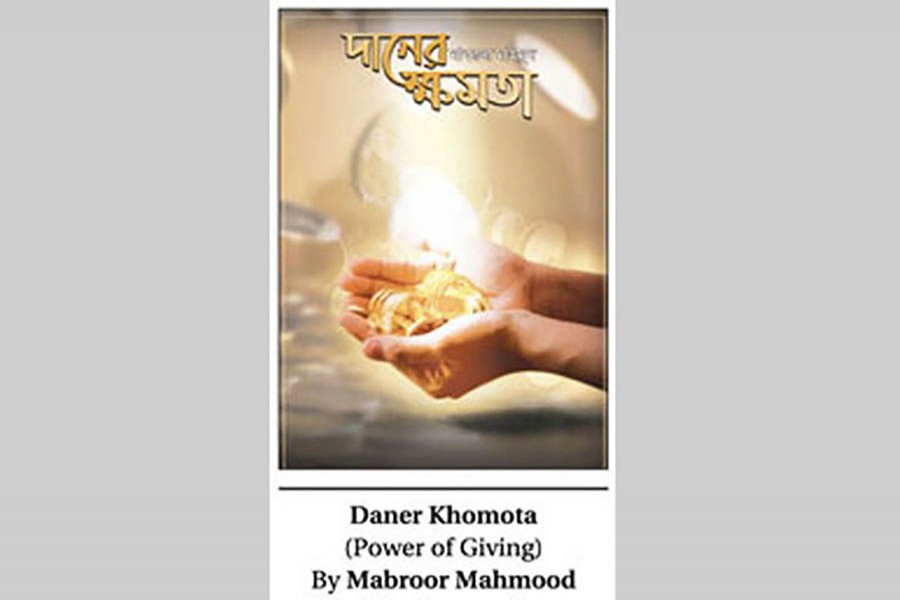
Published :
Updated :

The spirit behind standing by people during their sufferings and providing donation to them is mostly driven by religious teachings. Every religion has directed its followers to donate or give away the surplus belongings. Accordingly, many people give a part of their income and resources to the poor and the needy. Most of them do this to comply with religious obligations, and not always out of empathy. Thus, many givers do not find the mental satisfaction of giving. They also cannot connect their charity with any philanthropic virtue. In general, the average people help the poor on the expectation of heavenly rewards in afterlife.
Nevertheless, a lot of people do believe that there are some returns of their giving in this world also. They believe if they do not give regularly or refrain from helping the needy, despite having the capability, one or another worldly punishment might befall them. Mabroor Mahmood, an international banker, belongs to the category of people who continues to give away without expecting a return. But rewards do not elude them. In his small book titled Daner Khomota (Power of Giving), he interprets charity's worldly outcome in a broader context, along with his own experiences.
One of the interesting sections of the book is the author's effort to establish a link between charity and natural disasters globally. In his brief analysis, the author shows that though global gross domestic product (GDP) has increased over the years, global charity has actually declined. As a proxy indicator, Mabroor uses the ratio of combined official development assistance (ODA) of the developed world and the international development organisations. In fact, United Nations (UN) set a target of 0.70 per cent of the developed countries' gross national incomes (GNI) as a minimum threshold for aid to the developing nations. The target is still largely unfulfilled. For instance, in 2020, ODA by 30 member-countries of the Development Assistance Committee (DAC) of Organization for Economic Cooperation and Development (OECD) countries amounted to US$ 161.2 billion, representing 0.32 per cent of their combined GNI. Thus the developed nations in combination lag behind the target committed 50 years ago, though some of the countries meet the target individually.
The author also shows that natural catastrophes across the world have increased in the 1970s, the 1980s, and the 1990s and also in the later decades. He, however, identifies that culture of giving is much higher in the developed countries and they are less affected by natural disasters. For instance, he shows that the annual charity in the United States (US) in terms of the country's GDP increased to 2.05 per cent in 2015 from 1.93 per cent in 1998. However, although during the period the number of annual natural disasters increased in the US, the monetary value of damage due to the disasters is still very low.
Again, Saudi Arabia has strong culture of charity and it fulfils the obligation of Zakat, one of the five pillars of Islam. As eligible Muslims are obliged to pay at least 2.5 per cent of their disposable income and assets annually as Zakat, the country tries to fulfil the obligation strictly. And they also give aid to different countries. Mabroor observes that natural disasters are quite low in Saudi Arabia and tries to establish a link between charity and natural disasters. He doesn't conclusively say that there is an obvious causal relationship between the two but argues that the strong possibility cannot be ruled out.
The writer puts strong emphasis on the Quranic assertion that charity doesn't reduce wealth, rather increases it. He argues that even a few non-believers in Islam find it right. In this connection, the author presents a research of Dr Arhur C Brooks, an American economist. He was moved by US millionaire J D Rockefeller who believed that without charity works, his assets would have reduced. Rockefeller earned his fame both as a businessman and a philanthropist. Taking cue from Rockefeller, Dr Brooks collected data on income, spending, giving and wealth accumulation of 30,000 households in America for 50 years. By extensive data analysis, he concluded that both the real purchasing power and charity of these households increased significantly and there was a causal link between the two. Mabroor argues that this type of work needs to be highlighted to encourage people to provide donation to the needy.
The author categorically shows his strong belief in the Holy Quran and Hadith; and asserts the long-term benefit from giving, and his making it a practice in his own life. Describing his own experiences, he also argues that every eligible Muslim should donate as much as possible in charity, in accordance with the Quranic command, which purifies the mind and makes one happy.
The book, written in simple Bengali, also outlines three formulas of giving. These are: charity reduces greed for money; charity reduces possibility of hazards; and charity promotes selfless behaviour. The author also briefly discusses the possible application of the charity culture to corporate functions.
No doubt the book sheds light on charity and philanthropy from a different perspective, and opens an interesting discourse in this connection. It may encourage many Muslims and even people from other religions to be inquisitive about the religious obligations regarding charity as ordered by Islam the other religions. Some of the non-believers or those who don't believe in linking charity with the heavenly or worldly gains may also think afresh about this interpretation of charity as a great virtue.


 For all latest news, follow The Financial Express Google News channel.
For all latest news, follow The Financial Express Google News channel.